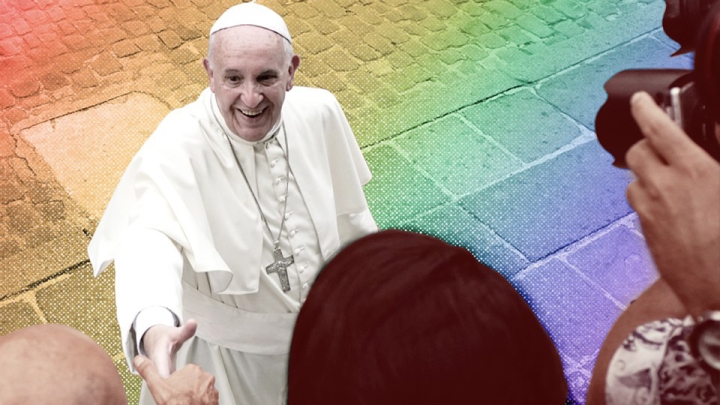Doubtless out of consideration for his host, the archbishop did not want to say, "In Africa, any so-called marriage between two men or two women would be considered witchcraft"—but that is obviously what he meant. In Cameroon, homosexuality is popularly associated with witchcraft, and transgenders can be arrested for the crime of attempted homosexuality.
But Africa is not the only place where such an association exists.
"Witchcraft is, in its purest essence, queer. It is a practice that affirms connection with our truest selves, while also superseding oppressive, patriarchal and heteronormative hierarchies...Trans and queer identities honor a more total and holistic experience of the self and of the divine...Trans-identifying witches deserve more credit in the witchcraft community for transmuting into their most authentic form, and creating a safe and inclusive space for those who are yet to come."
Though the above might seem to be taken from a recent papal motu proprio, it was in fact written by a London-based self-proclaimed priestess, sorceress, and spell-caster, Isabella Greenwood.
By declaring through the Dicastery of the Doctrine of the Faith that "a transsexual--even one who has also undergone hormone treatment and sex reassignment surgery--can receive baptism," Pope Francis is recognizing the legitimacy of the entire ideology of transgenderism.
The sorceress' use of the verb "transmute," with its connotations of alchemy and magic, emphasizes the witchery aspect of transgenderism. Indeed, so-called gender-affirming therapy can be seen as the casting of spells to induce young, susceptible people into destroying, seemingly by their own volition, their ability to reproduce and have families.
By declaring through the Dicastery of the Doctrine of the Faith that "a transsexual--even one who has also undergone hormone treatment and sex reassignment surgery--can receive baptism," Pope Francis is recognizing the legitimacy of the entire ideology of transgenderism and therefore condoning such procedures as phalloplasty, metoidioplasty, and vaginoplasty.
A commentator at the National Catholic Register, John Bursch, attempting to make the best out of an evil situation, insists that the pope would allow the baptism of transgenders only if they "acknowledged making a mistake, started again identifying with their sex, and [took] steps to undo any surgery, to the extent possible." But the pope has said none of this; impugning the known truth, he has in fact demonstrated by his actions that he believes the opposite: Gender-fluid He created them.
An article in the self-styled National Catholic Reporter references one of the pope's transgender-prostitute monthly luncheon invitees, who said that "the new norms made her feel more comfortable about maybe one day returning fully to the faith that she was baptized in but fell away from after coming out as trans. 'This norm from Pope Francis brings me closer to finding that absolute serenity,' she said, which she feels is necessary to be fully reconciled with the faith."
This transgender evinces no desire to repent but instead seeks approval and legitimacy in a church that has sacramentalized transgenderism.
Francis is not calling transgenders to repentance, he is feasting and glorifying them, holding them up as unholy role models for emulation by a disoriented faithful. He is encouraging children to question their God-given nature and to engage in irreparable acts of self-harm and self-mutilation.
Some have compared the pope's monthly luncheons to Christ's meals with sinners. "They that are well have no need of a physician, but they that are sick. For I came not to call the just, but sinners," Christ explains.
But Christ called sinners and the spiritually sick to repentance, to a change of heart, mind, direction and practice. Francis is not calling transgenders to repentance, he is feasting and glorifying them, holding them up as unholy role models for emulation by a disoriented faithful. He is encouraging children to question their God-given nature and to engage in irreparable acts of self-harm and self-mutilation.
The novelist Joris-Karl Huysmans went from an interest in the occult, witchcraft and the black mass on a spiritual journey which took him to conversion to Roman Catholicism and eventually to becoming an oblate at the Benedictine Abbaye Saint-Marine de Ligugé. Francis is attempting to put Catholics on the opposite path: from a life of contemplative prayer to witchcraft.
Archbishop Lefebvre pointed out the importance of the contemplative orders to religious life: "The Faith is the seed of the beatific vision, which is an eternally blessed contemplation. That is why the Church has always encouraged contemplative Orders and has placed them at the head of religious societies. Maria optimam partem elegit."
But with Cor Orans, the pope has begun to abolish the contemplative orders. In a subsequent weekly audience, he liquidated two millennia of Christian tradition with a few sentences: "Some spiritual masters of the past understood contemplation as opposed to action, and exalted those vocations that flee from the world and its problems to dedicate oneself entirely to prayer...[But] there is no opposition between contemplation and action...This may have come from the influence of some Neoplatonic philosophy that creates this opposition."
The contemplative prayer that Francis disdains is a safeguard against witchcraft. A priestess who "marries" homosexuals at a mock-mass served by transgender acolytes: this is the future of Pope Francis' church.



